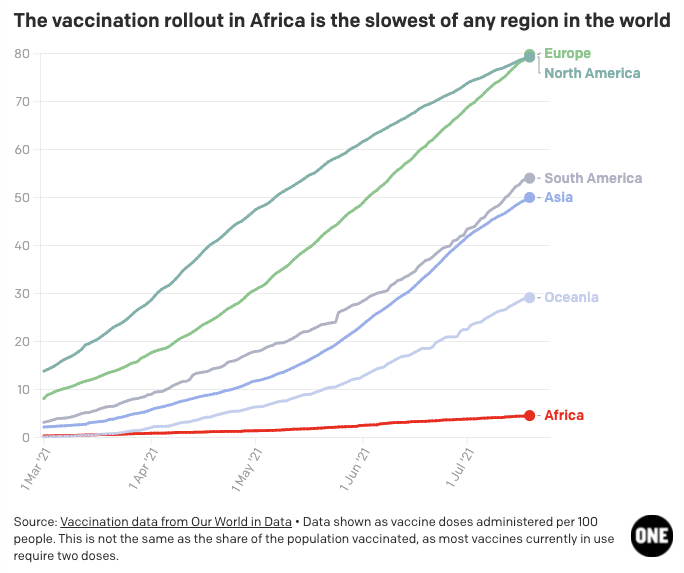Approximately one year ago, as the United States entered lockdowns across the country, Africa had relatively low COVID-19 case numbers and lower mortality rates. Cautiously optimistic, but concerned for what the future held, World Health Organization (WHO) Regional Director for Africa, Dr. Matshidiso Moeti, warned in May 2020, “…we must not be lulled into complacency as our health systems are fragile and are less able to cope with a sudden increase in cases.” Today, her words are more significant than ever as the reach and reality of COVID-19 is spreading across the continent.
On July 15th of this year, Africa’s case count has surpassed six million, with the last one million cases reported in only the previous 30 days. The experience across countries is not uniform. Eighteen countries are in resurgence, but others, such as Kenya, are starting to see a small decline in cases. There is difference even within countries. Despite the reported steep rise of cases in Malawi, our partners in rural Zomba are not seeing an overwhelming number at their hospital. One constant among our partners in Africa is that they are facing concerns similar to those we had during our case surge(s) as they figure out how to cope with losing their sense of normalcy. Along with anxiety and feelings of grief and helplessness, they are also battling additional burdens due to a lack of resources.
…we must not be lulled into complacency as our health systems are fragile and are less able to cope with a sudden increase in cases.
Dr. Matshidiso Moeti World Health Organization Regional Director for Africa (May 2020)
In a press conference last week, Dr. Moeti said that under-resourced health systems are facing shortages in health care workers, supplies, equipment, and other infrastructure needed to treat COVID-19 patients. Boosting oxygen production is a priority for the WHO following an assessment conducted in 6 countries that showed only one-third of needed oxygen is being produced. Additionally, monoclonal antibody treatment, which has been recommended by the WHO for severe illness, is largely inaccessible due to a cost of approximately $2,000 per treatment.

Vaccination in Africa is significantly behind the rest of the world. Source: Aftershocks: Data Dive, Africa’s Third Wave. Available at: https://www.one.org/africa/blog/africas-third-wave/
Indeed, while treatment is a pressing concern right now in face of so much disease, preventive measures cannot be ignored. Administering vaccines, an incredibly important preventive tool, is moving very slowly – with access being the largest bottleneck. Approximately 74 million doses of the COVID-19 vaccine have been received across 51 countries in Africa, and less than 18 million Africans are fully vaccinated. Another way to look at this – a continent with approximately 17% of the world’s population has received only about 2% of the vaccines administered.
Along with low vaccination rates, some countries have been dealing with other internal conflicts which are indirectly affecting virus transmission. For example, South Africa has recorded one of the highest levels of excess mortality, and in addition to facing a rise in cases, several parts of the country are facing devastating riots. One GPIC partner hospice in KwaZulu-Natal had to suspend providing palliative care services for a week during the rioting because movement wasn’t safe and, in some cases, not even possible. Other countries, such as Ethiopia and Eswatini, are facing internal crises that are limiting response activities and preventive measures to stop the spread.
Despite the early measures that were important to slowing the spread in Africa over the past year, the overall situation is worsening. Given the moment we are in, we are all deeply conscious of how COVID-19 has prompted many difficult situations, as it is hard to find somebody whose life hasn’t been touched by the pandemic. Illness, economic hardship, social isolation and hunger are just a few of the challenges. Global hunger levels have significantly increased as a fallout of the COVID-19 pandemic. In 2020, about 46 million more people in Africa were affected by hunger than in 2019.
These difficulties will continue until we achieve significant levels of vaccine coverage, which will also contribute to minimizing the emergence of variants. Acquiring and providing vaccines equitably across the globe is a step in the right direction toward recovery and rebuilding. In the meantime, our palliative care partners across the continent continue to ramp up their support for those in need of their services. You can help support their efforts by donating to our Disaster Response Fund.
Resources:
- Africa Centres for Disease Control and Prevention. https://africacdc.org/covid-19/
- World Health Organization Regional Office for Africa. https://www.afro.who.int/health-topics/coronavirus-covid-19 (note that several north African countries are located in the WHO Eastern Mediterranean Region and are not part of the WHO Africa Regional data)
